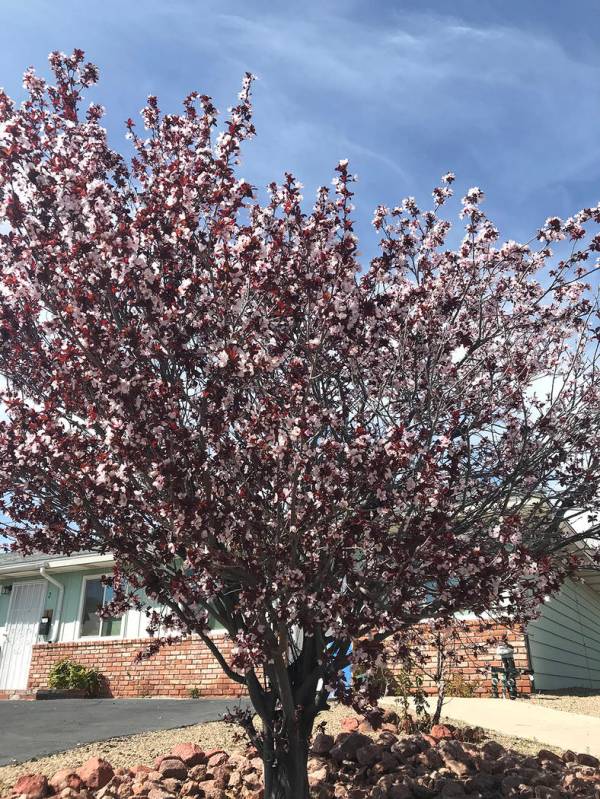
Be it higher than average rainfall or mild temperatures, it’s spring-ing early this year and weeds and blooms are abounding. Add these windy days of late, relentlessly swirling about the pollen, and we have a recipe for histamine hysteria. Complaints of sinus headaches, migraines, watery and itchy eyes, sneezing, even skin rashes and body aches have all come early this year.
I’ve always had a moderate reaction to spring here, but this year it hit hard. Praying for some new miracle in a box, I asked the pharmacist what he recommended.
“People think the only thing to do is take a pill,” says Hitesh Amin, a registered pharmacist from Albertsons Sav-on. He recommends first trying nonmedication approaches, like a long hot shower before bed and brushing your teeth while showering. “It will wash off the allergens from your skin and hair, and the heat will loosen congestion. … Then brushing will instigate clearing your throat and nose, and expectorating the allergens.”
He also suggests running a humidifier at night. “Keeping nasal passages moist fosters better respiratory health. … You know how you feel when you’re at the ocean.”
Another approach Amin recommends is taking immune-support vitamins like Emergen-C. “A healthy immune system helps fend off the body’s allergic responses to things.”
As for allergy aids, he recommends saline solutions, especially in a gel form, like NeilMed NasoGel. If additional medication is needed Amin recommends a nondrowsy antihistamine like a Loratadine tablet (i.e. Claritin).
For me, irrigating with Simply Saline has worked sinus wonders. It’s similar to using a neti pot, but faster and guaranteed sterile — a risk if the neti pot or water used in it isn’t sterilized. Antihistamine eye drops like Zaditor help too when the tearing won’t let up.
Many of us who don’t like to rely on drugs may benefit from chiropractic care. Not that adjustments “cure” allergies, but “by improving the communication between the brain and spinal cord, chiropractic care can help regulate and coordinate the body’s reaction to allergens,” according to the Palmer College of Chiropractic blog.
Back when “corona” was simply a cold one you drank with lime, the allergy/immunology community always endorsed wearing masks to reduce exposure to allergens. Especially when outdoors for prolonged periods (hiking, yardwork, etc.), wearing a proper mask will help. Sport masks like Respro Sportsta is particularly good for vigorous sports and can be found on websites like https://www.natlallergy.com and https://allergystore.com.
There are a host of measures we can take in and around the home that will reduce our exposure to allergens. Here’s my allergy busting to-do list:
■ Use minimum efficiency reporting system-rated HEPA heating, venting and air-conditioning filters and change them regularly. Look for HEPA filters that use the MERV rating system. Generally a MERV rating of 10 or higher is best for allergy sufferers.
■ Use a home air purifier. To really “clean” the air, you need a home air purifier. Before purchasing one consider room coverage area, air quality concerns, filter availability/cost, warranty and noise level. Look for “quiet operation” units.
■ Remove tree litter from around your HVAC unit. Debris buildup reduces a unit’s efficiency by blocking airflow and can actually cause your unit to age more quickly. With the unit off, remove any debris within at least 2 feet from the unit’s base.
■ Keep your windows closed and heating or air conditioning on. It’s that lovely time of year when neither the air conditioning or heat needs to run. Resist the temptation to open windows. If the air in your home feels stale, run your heating, venting and air-conditioning system in fan mode for circulation.
■ Clear pathways to entries. Clear paths of debris leading up to doors to reduce tracking in allergens.
■ Get undressed. Pollen attaches to our clothing and shoes. Contain your “outdoor” wear so it doesn’t spread more pollen around the house.
■ Lastly, make sure your car’s cabin air filter is clean. Drive with your windows closed, air conditioning on and indoor air recirculating.
Norma Vally is a seasoned veteran of home improvement; her career includes four seasons as host of Discovery Home Channel’s Emmy-nominated series “Toolbelt Diva.” A columnist and author, Vally splits her time in Southern Nevada, Los Angeles and New York City. Follow her on Facebook at Norma Vally “Toolbelt Diva” and visit her at www.NormaVally.com. Email Norma@NormaVally.com.